Hello Junkies,
Want to learn how to say I like you or I love you in Korean?
Get ready.
Below, you get useful Korean phrases you need to express your romantic feelings toward your crush. You will learn different ways to confess your feelings, give compliments, and ask them out.
Alright, now let’s learn some phrases!
How to Say I Love You in Korean
1. I like you → Jeo-neun Dang-shin-eul Jo-ah-hae-yo
- Formal
- 저는 당신을 좋아해요
- Jeo-neun Dang-shin-eul Jo-ah-hae-yo
- Informal
- 나는 너를 좋아해
- Na-neun Neo-reul Jo-ah-hae
Do you like a person? Not “love” but “like?” Well, here’s how you say I Like You in Korean.
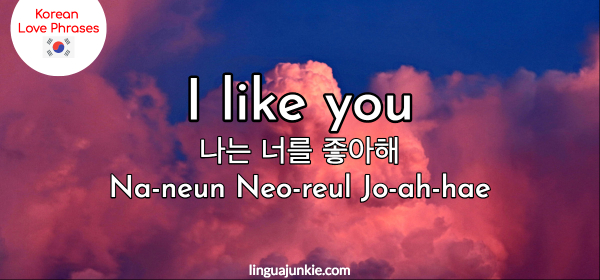
Audio Lesson to Help You Learn Korean
Want to learn Korean? Here’s an audio lesson (on how to greet others in Korean) that will get you speaking the language.
Just press the play button on the player below.
- Lesson #2 – Greetings – by KoreanClass101
This lesson came from KoreanClass101, a Korean language learning program and website.
Click here to visit KoreanClass101 for more fun & easy lessons.
2. I like you a lot → Jeo-neun Dang-shin-eul Man-e Jo-ah-hae-yo
- Formal
- 저는 당신을 많이 좋아해요
- Jeo-neun Dang-shin-eul Man-e Jo-ah-hae-yo
- Informal
- 나는 너를 많이 좋아해
- Na-neun Neo-reul Man-e Jo-ah-hae
Let’s intensify the phrase you learned above. Let’s add one new word.
- 많이 (Man-e) = a lot/many
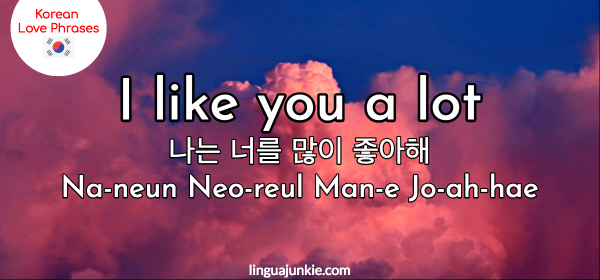
3. I love you → Jeo-neun Dang-shin-eul Sa-rang-hae-yo
- Formal
- 저는 당신을 사랑해요
- Jeo-neun Dang-shin-eul Sa-rang-hae-yo
- Informal
- 나는 너를 사랑해
- Na-neun Neo-reul Sa-rang-hae
Now, what if you have stronger feelings? How do you say I love you in Korean? This is it.
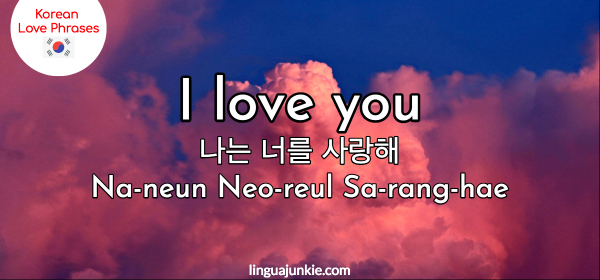
Words to know:
- 사랑 (Sa-rang) means love
4. I love you so much → Jeo-neun Dang-shin-eul Jung-mal Man-e Sa-rang-hae-yo
- Formal
- 저는 당신을 정말 많이 사랑해요
- Jeo-neun Dang-shin-eul Jung-mal Man-e Sa-rang-hae-yo
- Informal
- 나는 너를 정말 많이 사랑해
- Na-neun Dang-shin-eul Jung-mal Man-e Sa-rang-hae
Let’s intensify the love some more. Words to know:
- 정말 (jung-mal) means really.
- 많이 (Man-e) means a lot/many
- 정말 많이 is used to really emphasize how much you mean it.
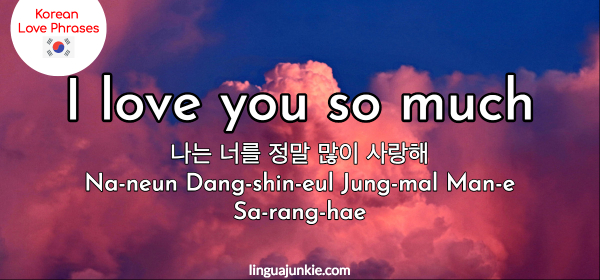
5. You make me go crazy → Dang-shin-ddae-moon-eh Mi-chi-gaet-eo-yo
- Formal
- 당신때문에 미치겠어요
- Dang-shin-ddae-moon-eh Mi-chi-gaet-eo-yo
- Informal
- 너때문에 미치겠어
- Neo-ddae-moon-eh Mi-chi-gaet-eo
In other words, this is how you say “I’m crazy about you.”
This is not a literal “I love you in Korean” phrase, but it works. You’re still admitting your feelings here.
Words to know:
- 때문에 (Ddae-moon-eh) = because of _(noun)_
- 미치다 (Mi-chi-da) = to go crazy
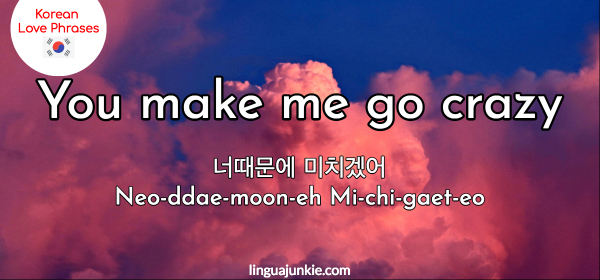
6. You are perfect → Dang-shin-eun Wan-byuk-hab-ni-da
- Formal
- 당신은 완벽합니다
- Dang-shin-eun Wan-byuk-hab-ni-da
- Informal
- 너는 완벽해
- Neo-neun Wan-byuk-hae
Words to know:
- 완벽 (Wan-byuk) means ‘perfect.’
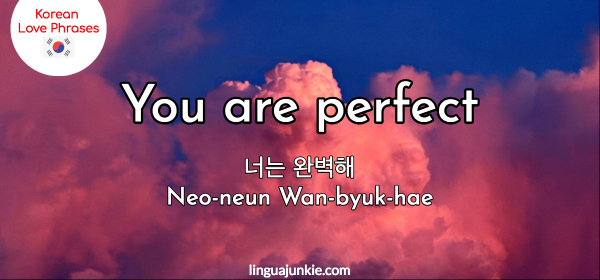
7. You are so cool/handsome (to male) → Neo-moo Meot-jua-yo
- Formal
- 당신은 너무 멋져요 Dang-shin-eun
- Neo-moo Meot-jua-yo
- Informal
- 너는 너무 멋져
- Neo-neun Neo-moo Meot-jua
Instead of telling them I love you in Korean, you can also use a compliment. This phrase is for guys.
Words to know:
- 멋진 (Mut-jin) means handsome/cool
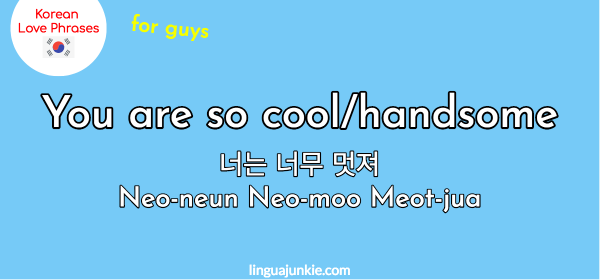
8. You are so beautiful/pretty (to female) → Dang-shin-eun Neo-moo Ah-reum-da-wua-yo
- Formal
- 당신은 너무 아름다워요
- Dang-shin-eun Neo-moo Ah-reum-da-wua-yo
- Informal
- 너는 너무 예뻐
- Neo-neun Neo-moo Yae-bbuh
Words to know:
- 아름다운 (Ah-reum-da-woon) = beautiful/pretty
- 예쁜 (Yae-bbeun) = beautiful/pretty
Both words carry the same meaning, but 아름다운 is used more in formal speech, or when you are referring to woman.
예쁜 is used often in informal speech, or when you are referring to a girl.
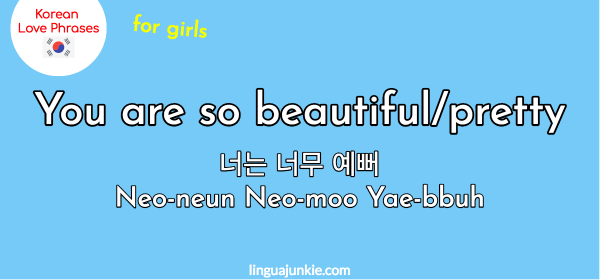
9. Do you want to be my girlfriend? → Jae Yeo-ja-chin-gu-ga Dwae-uh-ju-shi-gaet-seo-yo?
- Formal
- 제 여자친구가 되어주시겠어요?
- Jae Yeo-ja-chin-gu-ga Dwae-uh-ju-shi-gaet-seo-yo?
- Informal
- 내 여자친구가 되어줄래?
- Nae Yeo-ja-chin-gu-ga Dwae-uh-jul-lae?
Words to know:
- 여자친구 (Yeo-ja-chin-gu) means ‘girlfriend’.
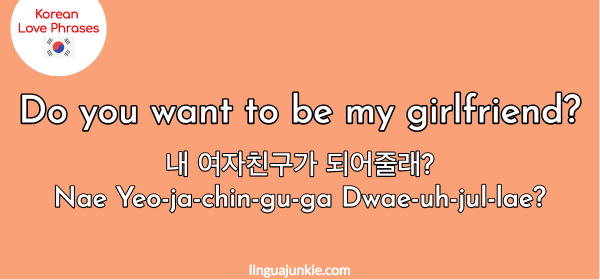
10. Do you want to be my boyfriend? → Jae Nam-ja-chin-gu-ga Dwae-uh-ju-shi-gaet-seo-yo?
- Formal
- 제 남자친구가 되어주시겠어요?
- Jae Nam-ja-chin-gu-ga Dwae-uh-ju-shi-gaet-seo-yo?
- Informal
- 내 남자친구가 되어줄래?
- Nae Nam-ja-chin-gu-ga Dwae-uh-jul-lae?
Words to know:
- 남자친구 (Nam-ja-chin-gu) means ‘boyfriend’.
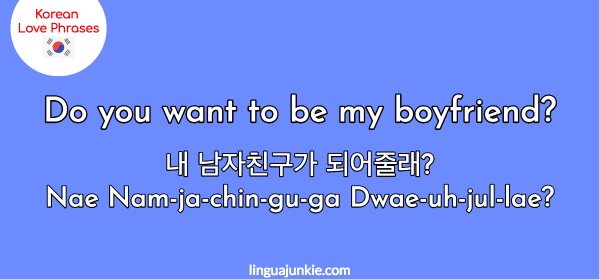
11. Do you want to be in a relationship with me? → Jeo-rang Sa-gwui-shil-lae-yo?
- Formal
- 저랑 사귀실래요?
- Jeo-rang Sa-gwui-shil-lae-yo?
- Informal
- 나랑 사귈래?
- Na-rang Sa-gwuil-lae?
In other words, this is how you say do you want to go out with me in Korean.
Words to know:
- 랑 ‘Rang’ means ‘with’.
- 랑 Means ‘with’, therefore 나랑 means ‘with Me’ in informal speech and 저랑 in formal speech.
- 사귀자 (Sa-gwui-ja) = means ‘to be in a relationship’.
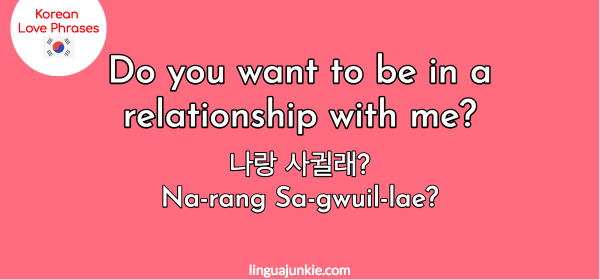
12. Do you want to marry me? → Jeo-wah Gyul-hon-hae-joo-shi-gaet-sseo-yo?
- Formal
- 저와 결혼해 주시겠어요?
- Jeo-wah Gyul-hon-hae-joo-shi-gaet-sseo-yo?
- Informal
- 나랑 결혼할래?
- Na-rang Gyul-hon-hal-lae?
Or, if you’re a bit more serious, you can ask them to marry you. That’s just as good as admitting love in Korean, right?
Words to know:
- 결혼 (Gyul-hon) means ‘marriage’
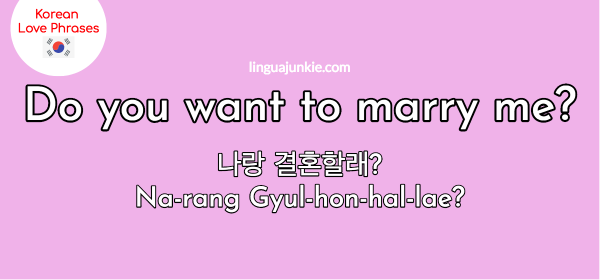
If you want to learn Korean marriage phrases, check out my lesson below.
How to Reply to I Love You in Korean
Did someone tell you they “like you” or “love you?”
How do you respond? Here’s how.
Below, you get a variety of answers, both formal and informal.
13. Thank you in Korean
What if someone says you’re pretty or that they like you? Thank you is one thing you can say.
- Formal Thank you
- 고맙습니다
- Go-mab-seub-ni-da
- Informal Thank you
- 고마워
- Go-ma-wua
14. “I Know”
This is a witty or playful response. Imagine someone telling you they love you and you tell them “I know.” I think Han Solo did that in Star Wars.
- Formal I know
- 알아요
- Al-ah-yo
- Informal I know
- 알아
- Al-ah
Words to know:
- 알다 (Al-da) means ‘to know’
15. “Me too”
This is just a simple response. “Hey, I like you.” To which you say, “Oh, me too.”
- Formal Me too
- 저도요
- Jeo-do-yo
- Informal Me too
- 나도
- Na-do
Words to know:
- 저 (Jeo) means ‘Me/I’ in formal speech
- 나 (Na) means ‘Me/I’ in informal speech
- 도 (Do) = too
14. How much?
As in, how much do you love me? This much? Or “thiiis” much?
- Formal How much?
- 얼만큼요?
- Eol-man-keum-yo?
- Informal How much?
- 얼만큼?
- Eol-man-keum?
Words to know:
- 얼만큼 (Eol-man-keum) means ‘how much/how many’.
You can also used 얼마나 (Eol-ma-na) which also means ‘how much/how many’.
15. “I love you too.”
A simple reply to getting a I love you in Korean.
- Formal I love you too
- 저도 당신을 사랑해요
- Jeo-do Dang-shin-eul Sa-rang-hae-yo
- Informal I love you too
- 나도 너를 사랑해
- Na-do Neo-reul Sa-rang-hae
16. Why do you love me?
It’s a good question to ask. I’d want to know why people love me too. It’s good to know!
- Formal Why do you love me?
- 왜 저를 사랑하세요?
- Wae Jeo-reul Sa-rang-ha-sae-yo?
- Informal Why do you love me?
- 왜 나를 사랑해?
- Wae Na-reul Sa-rang-hae?
Words to know:
- 왜 (Wae) = Why
17. “I go crazy because of you too”
- Formal I go crazy because of you too
- 저도 당신이 좋아 죽겠어요
- Jeo-do Dang-shin-e Joh-ah Jook-gaet-seo-yo
- Informal I go crazy because of you too
- 나도 니가 좋아 죽겠어
- Na-do Ni-ga Joh-ah Jook-gaet-seo
This is a response to the phrase #5, “You make me go crazy.”
Words to know:
- 죽다 (Jook-da) means ‘to die’.
- 좋아 죽겠다 is an expression Korean use when we like something too much we feel like dying. It’s a funny expression, but it basically mean ‘I go crazy because of you!’
18. “No, let’s not meet again.”
- Formal No, let’s not meet again.
- 싫어요, 우리 다시 만나지 말아요
- Sil-uh-yo, Woo-ri Da-shi Man-na-ji Mal-ah-yo
- Informal No, let’s not meet again.
- 싫어, 우리 다시 만나지 말자
- Sil-uh, Woo-ri Da-shi Man-na-ji Mal-ja
Want to BRUTALLY reject someone in Korean? You will need this. This is a strong response you can use when you absolutely hated your encounter and do not want to see that person ever again.
Words to know:
- 우리 (Woo-ri) = We
- 다시 (Da-shi) = again
19 “I don’t know. I want to stay as friends.”
- Formal
- I don’t know
- 잘 모르겠어요 Jeo-do-yo!
- I want to stay as friends
- 저는 친구로 지내고 싶어요 Jeo-do-yo, Jeo-do Bo-go-sip-peul-ggua-eh-yo!
- Informal
- I don’t know
- 잘 모르겠어 Na-do!
- I want to stay as friends
- 난 친구로 지내고 싶어 Na-do, Na-do Bo-go-sip-peul-ggua-ya!
Of course, you can’t learn Korean love phrases without learning how to friend-zone someone in Korean. Ouch. On the relationship side of things, I suggest you don’t use this. Just flat out reject them; they’ll be better off in the long run.
Words for friend-zoning people in Korean:
- 모르다 (Moh-reu-da) = don’t know
- 친구 (Chin-gu) = friends
- 지내다 (Ji-nae-da) = to stay
20. No, we are not the right fit for each other
Or, you can just flat out reject them.
- Formal
- No, we are not the right fit for each other
- 아니요, 우리는 서로 어울리지 않아요 Ah-ni-yo, Woo-ri-neun Seo-ro Eo-wool-ri-ji Ahn-ah-yo
- Informal
- No, we are not the right fit for each other
- 아니, 우리는 서로 어울리지 않아 Ah-ni, Woo-ri-neun Seo-ro Eo-wool-ri-ji Ahn-ah
Words to know:
- 이미 (E-mi) means ‘already’
- 우리 (Woo-ri) means ‘we’
- 서로 (Seo-ro) means ‘each other’
21. No, I already have a girlfriend
- Formal
- No, I already have a girlfriend
- 아니, 나는 이미 여자친구가 있어 Ah-ni, Na-neun E-mi Yeo-ja-chin-gu-ga It-sseo
- Informal
- No, I already have a girlfriend
- 아니요, 저는 이미 여자친구가 있어요 Ah-ni-yo, Jeo-neun E-mi Yeo-ja-chin-gu-ga It-sseo-yo
22. No, go away.
- Formal
- No, go away
- 싫어요, 저리가세요 Sil-eo-yo, Jeo-ri-ga-sae-yo
- Informal
- No, go away
- 싫어, 저리가 Sil-eo, jeo-ri-ga
Words to know:
- 싫다 (Sil-ta) means ‘hate/dislike’
- 저리가 (Jeo-ri-ga) means ‘go away’
23. No, you are not my type.
- Formal
- No, you are not my type
- 싫어요, 그쪽은 제 타입이 아니세요 Sil-eo-yo, Geu-jjok-eun Jae Ta-Ib e ah-ni-se-yo
- Informal
- No, you are not my type
- 싫어, 넌 내타입이 아니야 Sil-eo. Neo-neun Nae Ta-Ib e ah-ni-ya
This is another nice, friendly rejection in Korean.
Words to know:
- 그쪽 (Geu-jjok) means ‘you’, you can use this word you are referring to someone you don’t know too well, or someone you are not friendly with
- 그쪽은 (Geu-jjok-eun) = you are (in formal speech)
- 너는 (Neo-neun) = you are (in informal speech)
- 타입 (Ta-Ib) means ‘type’
- 아니야 (Ah-ni-ya) means ‘not’
- 너는 내 타입이 아니야 (Neo-neun Nae Ta-Ib e ah-ni-ya) means ‘you are not my type’.
24. Yes, of course!
- Formal Yes, of course!
- 네, 물론이죠! Nae, Mul-lon-e-jyo!
- Informal Yes, of course!
- 응, 물론! Eung, Mul-lon!
Let’s say they said “will you marry me” or “will you go out with me” and you actually like them.
Use this to respond.
Words to know:
- 물론 (Mul-lon) means “of course” or “for sure.”
Using Korean Names in Korean Love Phrases
Before you start saying I love you in Korean, read this.
There is also one important rule you should know. There is a very basic grammar rule you need to apply when saying anyone’s Korean name. Here it is:
- When a Korean name ends in a consonant, add 아(ah) to the end of his/her name.
- Example: 예진 (Yaejin) + 아( Ah) = 예진아 (yaejin-ah)
- When a Korean name ends in a vowel, add 야 (ya) to the end of his/her name.
- Example: 민지 (Minji) + 야 (Yah) = 민지야 (Minji-yah)
Now, you know how to say I love you in Korean.
You now can express your feelings and confess love. And, you know how to respond even if it means shattering someone’s heart into a trillion pieces, and smashing the pieces with a hammer, so that they can never put it back together again! I’m kidding!
I don’t judge. I’m just here to teach you Korean.
Some more fun Korean love lessons:
- Korean Phrases: 15 Love Phrases for Valentine’s Day & More
- Korean Phrases: Cute Korean Phrases & Questions. Part 8
- Korean Phrases: Learn the TOP 15 Korean Compliments
- Learn Korean – 13 Ways how to Say Marry Me in Korean
- Learn 14 Korean Love Quotes: Hangul & English Translations
– The Main Junkie
P.S. I highly recommend this for Korean learners. If you REALLY want to learn Korean with effective lessons by real teachers – Sign up for free at KoreanClass101 (click here) and start learning!

[…] how you say I like you in Korean. A very common and useful phrase to […]